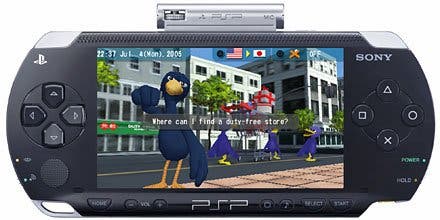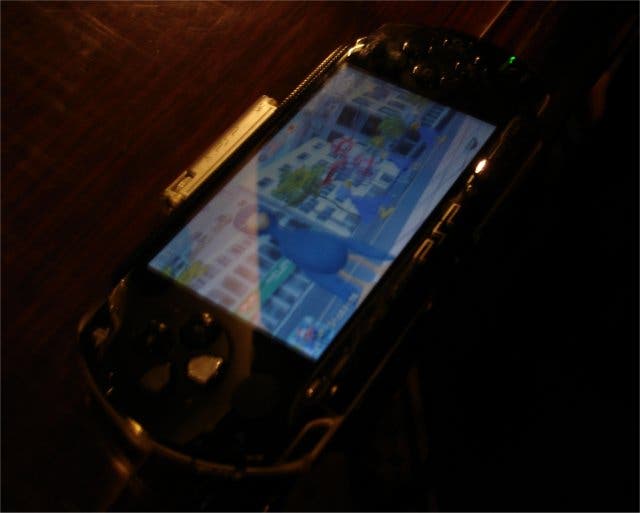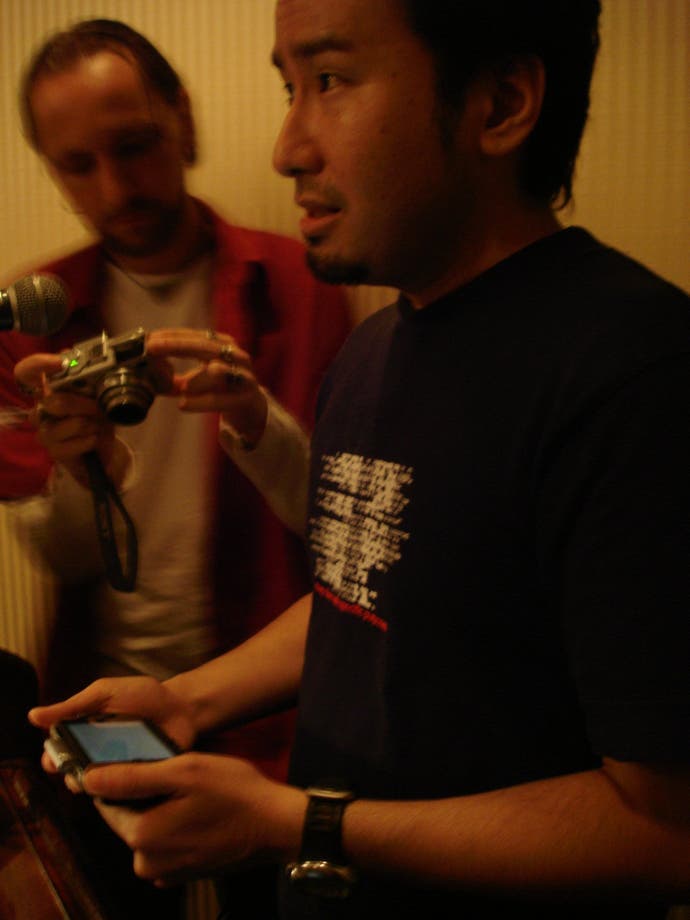TalkMan
Get lost in translation.
"Please, don't write that it's a translator!" Yoshi Yamamoto is imploring us. "It's more than that!" No worries, Yamamoto-san. After an hour in the company of your friend Max, we're not inclined to. As you say, it's much more - it's an ice-breaker, a fun way of bridging the language barrier, and easily the best example of a non-gaming product on the PlayStation Portable.
Last Friday Nintendo talked about expanding the gaming market and how it's trying to do so on every front. Sony gets less credit for this, despite its achievements with EyeToy and SingStar, but TalkMan is bound to help shift PSPs to new people even if it can't do it single-handed - and it's just as much an entertainment product as any of brain-testing DS titles Nintendo's had stalking the Japanese charts for the past few months.
So what is it? We'll let Yamamoto-san explain.
"Three years ago I went to Florence, Italy and I met this beautiful lady and she was sitting on a bench all alone," he starts. "I just said 'Hiya how's it going?' and she's like '?' And I was like 'How are you?' and she was like '?' And I thought 'Uh-oh. She doesn't understand English, and obviously won't understand Japanese,' so we just kinda waved. I so wanted to say something to her, but I couldn't.

"When I came back to Japan I went through some of the electronic dictionaries that we have on the market. They do translate if I do a sentence. It will translate; it's fine, but it's not fun. I wanted her to smile, but if I show this electric dictionary to her, maybe she might smile, but it's all text; it's just text. If it's a conversation or a book or something it's still just text. I wanted something that's entertaining. I was working for an entertainment company, so I wondered what I could do - and at the same time I heard these rumours of us coming up with a PlayStation Portable.
"I wanted to first make something like a translator, but a conversation-starter; an ice-breaker; but something entertaining. Because PSP has that big screen, I could show something to the person I want to talk to. So I needed something to entertain her. All the time I was thinking about her, by the way [everyone laughs]. And boom came the idea of having a humorous, cute character who could talk to her and make her laugh. Boom came the idea of Max. I tried to make him lovable, cute, funny, humorous."

Max, it's worth pointing out at this point, is a big blue bird, and he's the big heart of TalkMan. The idea is that you talk into a microphone attached to the PSP's USB slot, say what you want to say - to the girl on the bench, the waiter at the restaurant, the man at the checkout, the copper on the street, or whoever - and Max will translate it for you. There are various scenes (airport, hotel, shopping, etc.) and basic scenarios to pick from and each recognises various phrases - of which the game stores some 3,000 - and Max is not only capable of recognising them in four languages but also adding a bit of spark and emotion. You can even specify how forceful he is by setting the 'emotion level'.
Yamamoto-san reels off various Japanese phrases. Max listens, asks him to confirm, and then speaks to us. "I dropped my fork," he translates, shrugging and then smacking himself in the head repeatedly. "Where's the restroom? Could you point?" he asks, narrowing his eyes and glancing up and down the aisle as he crosses his legs in awkward panic. "Would you like to have a drink with me?" he gestures with a glass. It's also possible to show the translation in written form - black on white even - if you're talking to somebody who can't hear you very well.
You can also tell Max to wait for an answer. It ought to be pretty obvious if the girl on the bench wants a drink or not, but if you want her to respond you can have Max offer a selection of responses since she probably won't realise how to use TalkMan straight off the bat. It's been thoughtfully put together by Yamamoto-san, whose experience with foreign women may be limited but whose knowledge of language is quite impressive, having taught English to Japanese students at one point.

It's aimed at people between the ages of 20 and 30 and it's going to make those fumbling exchanges with foreign restaurateurs and girls-on-benches enjoyable. You can even write down their details, record a message and store them on a "Friends Map". At the moment TalkMan only recognises Japanese, American-English, Korean and Chinese, but a European version is inevitable (localisation apparently isn't a problem, although if the recognition software needs tweaks it may take a bit longer), and it really does seem like something you'd use.
Max is quite versatile. He can help start a conversation for you if you're shy - just tell him and show someone the PSP and he'll start, "Hi, I'm Max. My friend doesn't speak Japanese but let me translate for you and maybe you can have a little chat." If you'd rather not speak into the TalkMan mic, you can select the phrase you want manually. You can also bookmark phrases you expect you'll need, and view a web browser-style history of recent phrases, as well as a list of your most popular phrases. Ever been recommended something by a friend before you went abroad? TalkMan can record the name of your friend's favourite dish and then Max can ask a waiter for it - using your friend's voice recording to explain what you want.
Other tools include unit conversions (currency, length, weight, area, volume, temperature), and an Alarm clock. Amusingly, when the alarm goes off Max pops up and says hello, but he won't turn off the beeping noise until you've told him what a particular foreign phrase means in your native tongue - picking from a list of four. Slugabeds beware.

Perhaps the neatest of the extras though are the word games. There's a listening game, which involves matching phrases to prompts, and there's a pronunciation game, which tasks you with trying to say something in another language - letting you slow it down to hear it properly. The latter draws upon Yamamoto-san's experience as a teacher. "I used to teach the Japanese English, and we have a writing called Katakana, and I could write it in Japanese [for my students] but the problem is they start reading it, so I intentionally took that off [TalkMan], and make the player listen and get the real way of training pronunciation."
Sony's already planning ways to make TalkMan better next time. Getting the microphone right consumed a lot of the hardware team's time, so there wasn't enough left to include downloadable content, but that's very much a possibility (Yamamoto-san talks about downloadable maps, local info on restaurants and the like), and there's also the potential for straight-talking Max, better suited to formal exchanges.
That said, the current version's limitations are surprisingly few, and its voice recognition is quite excellent. It didn't get confused at all during our presentation, even when Yamamoto-san plucked a reluctant hack out of the audience to join him and Max on the podium; and apparently with the mic level lowered it'll even work in loud rooms, even pachinko halls. The particularly low-voiced or softly spoken might confuse Max from time to time, but on the whole he's a bird with an ear for everything. And if TalkMan does what it ought to do, he'll be a feather in Sony's cap.
TalkMan is due out in Japan this November - but of course it will work in English. A European version is planned, but there's no date just yet.

